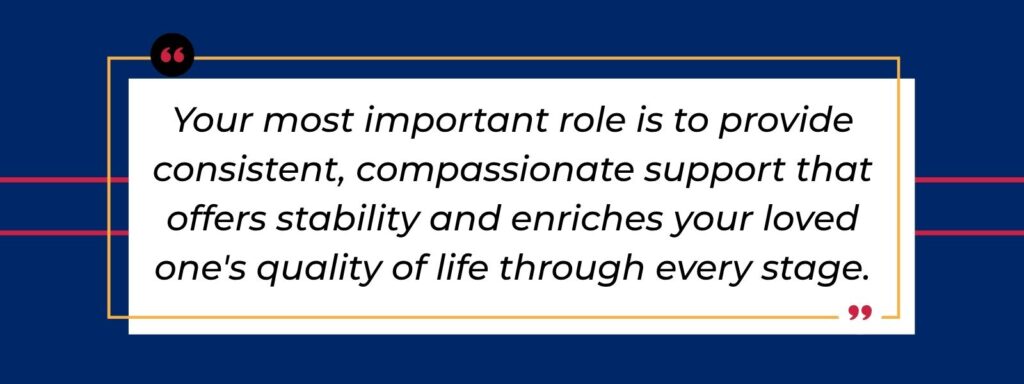Caring for someone with Alzheimer’s is an act of patience, love, and steady commitment. However, it sometimes feels unpredictable when you’re trying to offer comfort and reassurance in the moments that matter most. Alzheimer’s disease is extremely complicated, and the easiest way to care for your loved one begins with understanding what the future holds.
Caregiving is rewarding, but it comes with real challenges. As symptoms progress, routines shift, and the emotional toll can build. If you ever feel overwhelmed by the responsibilities of caregiving, it’s time to start thinking about memory care for your loved one.
Key Takeaways
- A caregiver provides emotional reassurance, helps with daily routines, and creates a safe, nurturing environment.
- Managing your own emotional well-being through support systems and self-care is important for both you and your loved one.
- Practical strategies, like consistent schedules and patient communication, can simplify daily life and reduce stress.
- Exploring professional support options like memory care can introduce a new level of compassionate help when needed.
What’s Involved When Supporting Someone with Alzheimer’s Disease?
As a caregiver, you provide a unique and special kind of support that makes a real difference in your loved one’s life. A consistent presence helps create a sense of familiarity and steadiness for a loved one who may feel unsure of their surroundings or routines.
Emotional Reassurance and Connection
A calm, steady presence can help your loved one feel more secure, even during moments of confusion or uncertainty. Simple gestures, like holding their hand, maintaining eye contact, or speaking gently, can bring familiar comfort to their day. Over time, these small interactions form a rhythm your loved one can rely on, even when memories shift.
Daily Routines That Support Comfort
Regular schedules can make the world feel more predictable for someone living with Alzheimer’s. This is where routine becomes essential. By keeping meals, hygiene routines, and activities at similar times each day, you help create a sense of stability that lessens stress.
Creating a Safe, Familiar Home Environment
A few simple home adjustments can make daily life easier and safer for your loved one. Clear, open pathways and added lighting help reduce fall risks, especially in areas like hallways or bathrooms. Keeping commonly used items in the same place helps here as well, as your loved one can always know where their most used items will be.
Tips for Caregivers of Someone with Alzheimer’s Disease
Supporting someone with Alzheimer’s is meaningful but demanding. These practical strategies can help you maintain balance while giving your loved one the support they need.
Keep Communication Simple and Calm
Shorter sentences and gentle cues often make conversations easier for your loved one to follow. Avoid rushing or repeating too quickly, as giving them time to respond helps prevent frustration. You may also find that visual cues, like pointing or demonstrating, help guide the moment.
Build Predictable Daily Rhythms
A consistent schedule helps your loved one know what to expect each day. Regular meals, familiar activities, and a set bedtime can create a sense of safety and ease. Predictability helps reduce agitation, especially during transitions like mornings or evenings.
Adapt the Home for Safety and Convenience
Thoughtful home adjustments can protect your loved one from common hazards. Extra lighting, secured rugs, grab bars, and other safety features in key areas can help reduce slips and falls, which keeps your loved one safe in their daily life. Keeping the layout simple and clutter-free makes it easier for them to navigate the space, which helps them stay home for longer.
Use Activities That Provide Comfort and Focus
Gentle, familiar activities can offer a sense of calm and purpose. Folding towels, sorting objects, listening to music, or looking through old photos can be a soothing part of the day. These tasks give your loved one something meaningful to focus on without requiring complex memory or decision-making.
Share Responsibilities When Possible
Caregiving is too much for one person to manage alone, and sharing responsibilities helps keep the experience sustainable. Ask family members, neighbors, or friends if they can help with errands, meals, or weekly visits. Even small contributions can take pressure off your shoulders.

Signs It May Be Time to Consider Professional Memory Support
Even with a proper plan, it’s important that your family remembers the complexities of Alzheimer’s disease. This condition is a type of dementia, and it progresses over the years. Eventually, there may be a point when your loved one needs more care than you can reasonably offer. That’s entirely okay, and your family still has options. So, watch for signs such as:
- Increasing safety concerns, such as wandering or fall risks
- Greater need for supervision throughout the day or night
- Persistent caregiver stress or exhaustion
- Sudden or unpredictable behavioral changes
- More complicated medical or personal care needs
- Disruptions to sleep or daily routines that are hard to manage
These signs don’t mean you’ve reached your limit. They simply mean your loved one’s needs have changed, and you’re exploring the next step thoughtfully.
How Professional Memory Support Helps Families
Memory care communities are designed to offer structure, safety, and meaningful engagement when cognitive decline is involved. These communities give professional support in a setting designed to help your loved one every day. Everything—from the activities offered to your loved one’s living space—is built around meeting them where they are.
For families, this level of support can ease daily pressures and create more opportunities for quality time. Instead of managing every task alone, you can focus on moments of connection. This takes away a significant amount of stress and lets you focus on bonding with your loved one, and this opportunity can be incredible.
Let Our Team Give Your Family the Support You Deserve
Alzheimer’s caregiving isn’t easy, but you don’t have to navigate it alone. Whether you’re managing daily routines, adapting the home, or trying to balance your own well-being, our team is here for you and your family. Memory care is one option that can offer additional structure, especially when safety or daily care needs become more complex.
Here at All American Assisted Living at Raynham, we know how to care for older adults with memory-related conditions, and we’re here to help your family find the right level of support. In our community, your loved one will be able to thrive, and we’re ready to welcome them home. Schedule a visit with our community today to learn more!





